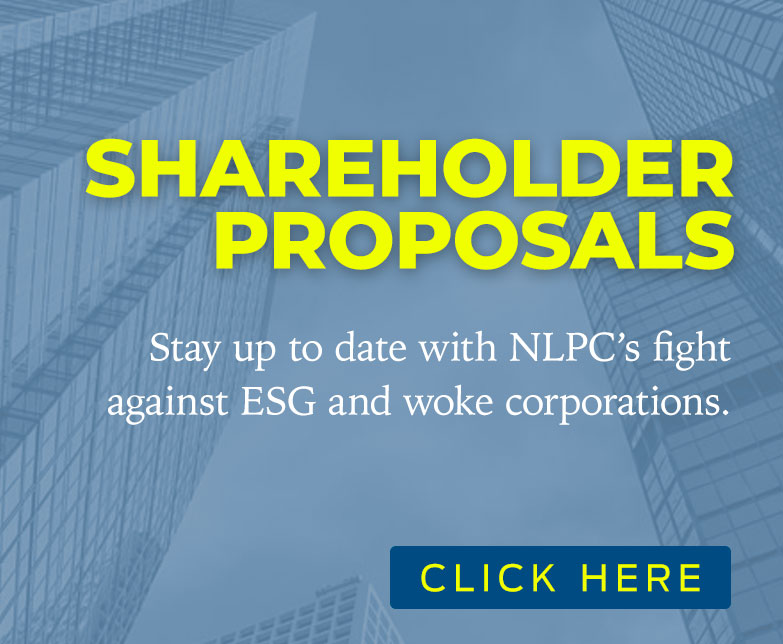The Harvard Law School Forum on Corporate Governance monitors trends, and its contributors report on their research findings and advocacy priorities as it pertains to engagement with public companies. Most who write for the forum are left-leaning types who support Environmental, Social and Governance priorities, but the law school’s center dedicated to the study of the corporate world is a reliable source of information.
Last week contributors from law firm Gibson, Dunn & Crutcher LLP delivered their observations and analysis about the recently completed 2023 proxy season, which is when the majority of major corporations hold their annual meetings, where director slates and shareholder proposals are voted upon. Some of the law practice’s co-authors were also respondents on behalf of companies to some of National Legal and Policy Center’s shareholder proposals this spring.
A few excerpts from Gibson Dunn’s report that reference NLPC’s activities in recent months:
Proponents’ use of exempt solicitations grows again, and now others are joining the game. Exempt solicitation filings continued to proliferate, with the number of filings reaching a record high again this year and increasing almost 22% over last year and 64% compared to 2021. As in prior years, the vast majority of exempt solicitations filed in 2023 were filed by shareholder proponents…in order to draw attention and publicity to pending shareholder proposals.
The political left has dominated when it comes to this aspect of shareholder proposal-related activities.
In simple terms, the process is this: A shareholder proponent may present a resolution for a public company’s annual meeting that is strictly limited to 500 words; The company may respond (almost always in objection) to the proposal in its proxy statement, with unlimited wordage; Then other shareholders (including the proponent) or other outside advocates may weigh in on proxy items (such as director nominations and individual proposals) with reports to the Securities and Exchange Commission called “Notice(s) of Exempt Solicitation,” in an effort to gain votes in support of their positions. These NESes are posted in the SEC’s EDGAR system under each company’s list of filings with the agency, and are distributed to shareholders who are interested in the company and its financial filings.
This year was the first in which NLPC began filing NESes at the SEC, and you can find all of our reports here. To our knowledge, we are the first among non-liberal shareholder activists to produce such reports, which we have also called “proxy memos.”
More from the Gibson Dunn report, from a section noting “Key Shareholder Proposal Topics” for the 2023 proxy season:
The number of shareholder proposals relating to human rights, including those calling for a report on or an impact assessment of risks of doing business in countries with significant human rights concerns or for an assessment of the human rights impacts of certain products or operations, increased during the 2023 proxy season. In 2023, shareholders submitted 37 human rights proposals (up from 16 proposals submitted in 2022), including seven to companies that received human rights proposals last year. Fourteen of these proposals were ESG-skeptic proposals submitted primarily by the National Legal and Policy Center (“NLPC”) and [National Center for Public Policy Research], generally requesting reports on the risk of the company’s operations in China. The 24 human rights proposals voted on received average support of 12.3% overall, with the proposals focused on operations in China receiving average support of 4.9% and the remainder receiving average support of 19.6%.
Two observations on this point:
- The Gibson Dunn co-authors, much like a Morningstar reporter last year, fall into the lazy habit of categorizing certain proposals according to the proponents’ general ideology, rather than the nature of the proposals themselves. In their eyes, “conservative” equals “anti-ESG” (or “ESG-skeptic) and “liberal” (many would say “mainstream,” since they think leftism is mainstream) equals “pro-ESG.” However, our nine proposals addressing transparency about business risks in China, which Gibson Dunn correctly tethers to human rights, were the types of proposals that have been proposed by progressive shareholders in the past. Bottom line: Analysts should categorize the proposals according to their content, not according to who proposes them.
- The poor support for the human rights proposals, including ours, further illustrates the broken nature of institutional investing and shareholder preferences. Large fund managers such as BlackRock, State Street and Vanguard are themselves heavily invested in China and thus have no desire to have greater shareholder scrutiny on their activities in the communist nation. Therefore they vote their shares accordingly. Democratizing the proxy votes their fund customers at least gets us a little closer to the genuine will of individual shareholders.
A final excerpt from the Gibson Dunn report addresses NLPC’s nine proposals for an “independent chair,” which would have required a company to implement a policy that required the board chairman and CEO positions to be held by two individuals instead of one:
…there was a significant increase in the number of proposals related to policies of separating the roles of chair of the board and CEO, which was the most frequent corporate governance proposal topic in 2023. There were 85 independent board chair proposals submitted this season, up from 50 proposals in 2022….nine were submitted by the NLPC, which has historically not focused on the submission of proposals related to governance topics…. The 72 independent board chair proposals voted on so far this year received average shareholder support of 29.8%, in line with 2022 results, with no proposals receiving majority support. Notably, the proposals submitted by the NLPC received average shareholder support of 21.2%, compared to average shareholder support of 30.9% for the remaining proposals.
Here the Gibson Dunn authors are incorrect, at least if last year counts as “historically.” Six of our proposals in 2022 addressed independent chair policies, and if (as many observers do) you count our proposals to disclose charitable contributions and lobbying expenditures from last year as “governance topics,” then nearly two dozen of our 2022 proposals addressed the “G” in “ESG.” Gibson Dunn segregates those latter two topics as “civic engagement proposals,” but many “pro-ESG” shareholders have introduced them in the past at annual meetings.
Finally, it is interesting to note the vote support disparity between others’ independent chair proposals and NLPC’s — a nearly 10 percent gap. Considering that the action items requested in the proposals’ wording are no different whether they were sponsored by left-leaning shareholders or by us, it either reflects a voter bias based on the proponent, or a shortcoming in our proposal campaigns against Chairman/CEO types.
Maybe we’re just being too hard on these elitist executives.
Nah.
(Pictured above: NLPC Chairman Peter Flaherty was arrested at the annual meeting of Berkshire Hathaway in May 2023.)









